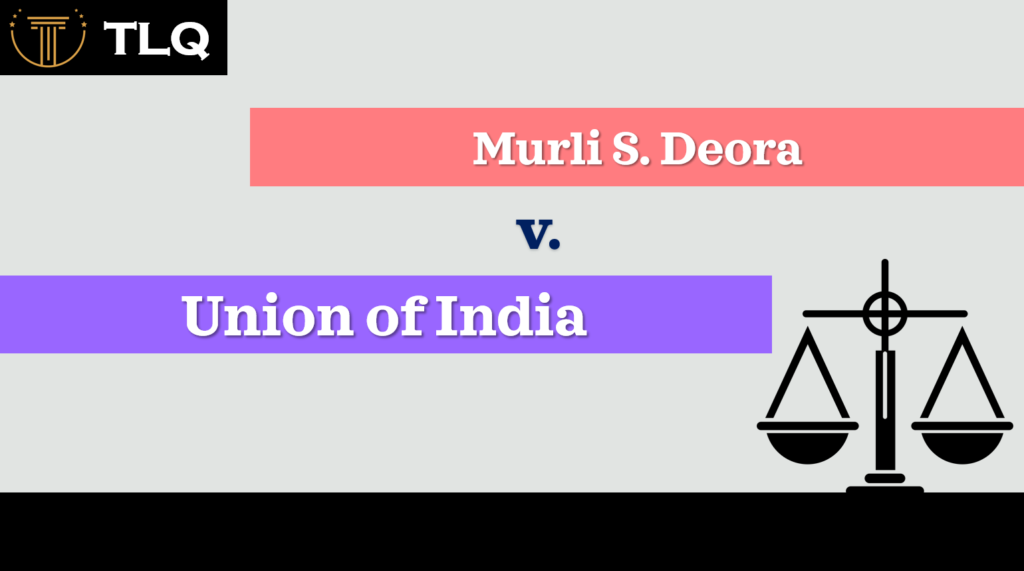Published on 29th August 2025
Authored By: Heer Bhanushali
SVKM’s Pravin Gandhi College of Law
|
Citation |
AIR 2018 SC 4321; (2018) 10 SCC 1 |
|
Court |
Supreme Court of India |
|
Judges |
Chief Justice Dipak Misra, Justice Rohington Nariman, Justice D Y Chandrachud, Justice A M Khanvilkar, & Justice Indu Malhotra |
|
Date of judgement |
6th September, 2018 |
|
Petitioners |
Navtej Singh Johar, renowned dancer Ritu Dalmia, Restaurateur Ayesha Kapur, Restaurateur Aman Nath, Hotelier Sunil Mehra, Media
|
|
Respondent |
Union of India, represented through Ministry of Law and Justice |
|
Key Provisions |
Indian Penal Code, 1860 – Section 377 Constitution of India – Articles 14, 15, 19(1)(a), 21 Yogyakarta Principles (2006) Universal Declaration of Human Rights |
Statement of Facts
- Section 377 of Indian Penal Code (IPC) traditionally punished voluntary sexual acts of persons of the same gender stating that such actions are against the principle of the natural order.[1]
- The origin of section 377 was based on the British Buggery Act, 1533, which was a colonial-era law that forbade sexual acts, considered to be unnatural.
- In 2016, a writ petition was filed by five members of the LGBTQ+ community seeking to get the case adjudicated by a three-judge bench of the apex court.[2]
- The petitioners challenged the 2013 Suresh Koushal judgement[3], which had overturned the Naz Foundation judgement of 2009[4].
- After hearing the plea to review the previous decision, the bench of three judges sent the case to a larger bench of the Constitution to decide the case.
- On 5th January, 2018 the Supreme Court formed a five-judge constitutional bench.
Procedural History
- Naz Foundation v. the Union of India[5]
- In 2009 Naz Foundation, a NGO works for sexual health issues and LGBTQIA+ rights and gender equality, approached the Delhi High Court challenging the constitutional validity of Section 377 of the IPC.
- The petitioners argued that Section 377 did not just institutionalise the discrimination and allow abuse and harassment of the LGBTQ+ community but also created a major impediment to any effort aiming at protecting the public health, especially HIV/AIDS prevention and management.
- The Court stated that Section 377 was contrary to the provisions of the Constitution as it infringed upon the fundamental rights under the Constitution of India under Articles 14[6] and 21[7].
- Suresh Koushal v. Naz Foundation[8]
- After the Delhi High Court gave the Naz Foundation judgment in 2009, Suresh Kumar Koushal and others went against the verdict by filing a writ petition before the Supreme Court in 2013.
- The Supreme Court in 2013 set aside the 2009 judgement of the Delhi High Court in the Naz Foundation case and restored Section 377 to be deemed constitutionally valid.
- It also held that only the Parliament has the powers to repeal Section 377.
Issues
- Does the continued penalisation of consensual adult same-sex relations, under section 377 IPC, represent non-compliance with the fundamental rights granted under Articles 14, 15, 19 and 21 of the Indian Constitution?
- Does it restrict freedom of expression under Article 19(1)(a)?
- Can a constitutional democracy continue to hold in force laws which criminalise consensual same-sex intimacy between adults?
Arguments Advanced by Petitioners
A group of petitioners led by Navtej Singh Johar and LGBTQ+ activists submitted their case against IPC Section 377 to challenge the constitutional infringement caused by the laws in the Indian Penal Code. The parties made their case through precedents and constitutional morality together with Articles 14, 15, 19 and 21.
- Fundamental Rights Violation:
- According to Article 14 (Right to Equality) he argued Section 377 created unfair discrimination against LGBTQ+ individuals because it did not clearly define “carnal intercourse against the order of nature” thus resulting in discriminatory treatment.
- The Supreme Court, through prior verdicts, confirmed its position of rejecting any laws which demonstrated an absence of rational classifying principles and arbitrariness.
- Under Article 15 (Prohibition of Discrimination) the provision enforced discrimination through sexual orientation measures that fall under the legal definition of “sex” under Article 15.
- The petitioners argue that sexual orientation and identity are part of an individual and cannot be interfered, under Article 19(1)(a), which upholds the right to express oneself freely. Under Section 377 LGBTQ+ communities had to hide their sexual nature which resulted in social isolation combined with prejudice along with psychological damages. The Supreme Court had previously held that speech and expression included self-expression and identity.
- Navtej Singh Johar verdict acknowledged that Section 377 was a breach of Article 21 as it had intruded into the right to privacy, dignity, and personal liberty of an individual and compromising the protection of a consensual relationship among adults within confined premises.
- Privacy Rights and Autonomy:
- The case of Justice K.S Puttaswamy v. Union of India[9] serves as a basis for Johar who argues that privacy rights include sexual orientation as an inherent part of personal liberty. In his argument Johar relied on the Union of India judgment to show sexual orientation belongs to personal liberty components under privacy rights. Privacy rights protected by the Constitution were infringed when the law made consensual private acts illegal while limiting personal freedoms.
- Outdated Colonial Law:
- The law described as Section 377 showed its roots in colonial times yet failed to meet present-day constitutional standards as well as societal values and norms. According to the petitioners, the prohibition allowed harassment and discrimination against LGBTQ+ individuals thereby contradicting a modern democratic nation.
- Negative Relation to Dignity and Mental Health:
- The petitioner showed how the application of Section 377 led LGBTQ+ people to face threats combined with intimidation and social isolation. The restriction of their dignity along with their self-worth constituted a life-threatening violation under Article 21.
- Non Compliance with International Legal Standards:
- Petitioners used international principles from the Yogyakarta Principles on Sexual Orientation and Gender Identity to emphasize the importance of equality and discrimination protection for LGBTQ+ people. India must abide by international standards through the decriminalization of consensual same-sex relations according to his argument.
- Differentiation Between Consensual and Non-Consensual Behaves:
- The petition emphasized that Section 377 did not distinguish between adult consensual sexual behavior from both non-consensual sexual activities and minor-related acts. A failure to distinguish between different sexual acts resulted in illegalization’s of consensual private conduct that merged with the prosecution of sexual abuse and bestiality.
Arguments Advanced by the Respondents
- Societal Morality:
- The respondents asserted Section 377 represents societal values and majority standards so it should remain undefeated unless the constitution gets breached.
- They argued that the term ‘carnal intercourse against the order of nature’ captured the existing social prejudices at that time instead of representing any constitutional ideal.
- However, the Supreme Court denied this defense because constitutional morality should prevail over majoritarian morality.
- Legislative Domain:
- The respondents stated that any amendment of Section 377 was a methodical prerogative of the legislature and beyond the competence of the judiciary. Judicial intervention about these matters would exceed constitutional authorization.
- The government cited judicial restraint, stating that the legislature must decide on matters involving morality and public order.
- The Supreme Court denied this argument by establishing that fundamental rights need protection even when the government has not taken action.
Holding/Judgement
On 6 September 2018, the Supreme Court of India gave a unanimous decision, interpreting Section 377 to exclude the consensual sexual activities between adults away in private. The important aspects of the decision can be outlined as follows:
- The Court reiterated that Section 377 fails the test of equality under Article 14, as it results in differential treatment rooted in personal identity and intimate expression, and also offends Article 15 by permitting discrimination linked to sex[10].
- The provision was also found to violate Article 21 in the sense by infringing the intrinsic rights of an individual to dignity, personal liberty, and the freedom of choice in intimate life.
- It inhabits the LGBTQ individual’s ability to fully realise their identity by violating their right to freedom of expression as per Article 19(1)(a)[11]
- It quashed Section 377 of the Indian Penal Code. It did not strike down the entire section, but parts of it only decriminalised “same sex relations between consenting adults”[12].
- The Court used the principles of transformative constitutionalism, stating that the Constitution is a living document that would have to evolve in accordance with the dynamics of social life and preserve the rights of minorities against majoritarian bias.[13] The judgment disapproved of the possibility that the constitutional rights could be barred to a “minuscule minority”, as previously held in Suresh Kumar Koushal v. Naz Foundation.[14]
Ratio Decidendi
Any consensual sexual activity by adults in the privacy of their homes cannot be criminalized because it infringes on the right to equality, dignity, privacy and expression under Article 14, 15, 19(1)(a), and 21. The state should not interfere in the autonomy of the person in the decision of intimate choice and the constitutional morality should override the social prejudice.
Obiter Dicta
Justice Chandrachud opined on the need of judicial consideration to vulnerable communities and Justice Malhotra quoted the absence of public health and social protection owing to the chilling effect of Section 377. Although such statements are not considered binding, they have been repeatedly used in scholarly writing and later cited in court.
Conclusion
The Navtej Singh Johar decision represents the victory of constitutional values above traditional values which stagnate social progress. Through its elimination of Section 377, the court restored historic justice while establishing a new purpose for the Constitution to achieve social equity. Though it is the basis of equity attainment, the path towards total equality is long. The decision serves as a significant success and, at the same time, reminds the LGBTQ+ community about unfinished business in terms of seeking their full acceptance. The essential assessment of Navtej Johar demands how well India implements its recent court decision into realistic rights for LGBTQ+ residents.
References
[1] The Indian Penal Code, 1860, S. 377.
[2] Navtej Singh Johar v. The Union Of India, AIR 2018 SC 4321
[3] Suresh Kumar Koushal v. Naz Foundation, AIR 2014 SC 563
[4] Naz Foundation v. The Union of India, 160 (2009) DLT 277
[5] ibid 4
[6] Article 14 of the Indian Constitution, “the state shall not deny to any person equality before the law or equal protection of the laws within the territory of India”
[7] Article 21 of the Indian Constitution, “no person shall be deprived of his life or personal liberty except according to procedure established by law.
[8] ibid 3
[9] K. S Puttaswamy v. The Union Of India, AIR 2017 SC 4161
[10] Article 15 of the Indian Constitution, “ the state shall not discriminate against any citizen on the grounds only of religion, race, caste, sex, place of birth or any of them”
[11] Article 19(1)(a) of the Indian Constitution, “grants citizens the right to freely express their thought, opinions and ideas”
[12] ibid1
[13] Maloo, R., & Katiyar, V. (n.d.). Navtej singh johar – A constitutional analysis. Scribd. https://www.scribd.com/document/571181494/Navtej-Singh-case
[14] Navtej singh johar vs union of india: Decriminalization of section 377 IPC. (n.d.). Testbook. https://testbook.com/landmark-judgements/navtej-singh-johar-vs-union-of-india




